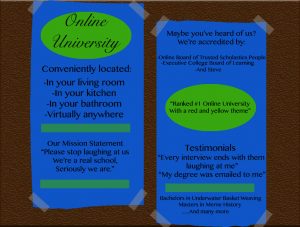
Academic partnerships place convenience over quality in education
In an attempt to tap into more of the financial benefits of increased enrollment, some colleges and universities have chosen to compromise the quality of what is being taught to students by partnering with online program management companies such as Academic Partnerships (AP).

AP is exclusively concerned with their bottom line, and their partnerships with higher learning institutions to allow students to attain a degree entirely online are designed to maximize efficiency and boost customer (or is it student?) satisfaction. Although this makes it easier for students to obtain their degree, it does not provide them with the necessary experience and skills that will help them succeed past graduation. AP is, after all, an advertising firm that is concerned with the marketability of their product, which in this case is students’ education. A company selling a product will do whatever it takes to make a sale.
A major issue in partnering with a company to facilitate education is that AP may manipulate what is being taught in order to make it more appealing to students. If a professor’s online course through AP receives complaints that it is too difficult, pressure may be applied to make the course easier for students. Not only does this take away from the quality of the material, but it is a waste of professors’ talents and expertise in their field. Professors need to be able to design their courses however they see fit in order to optimally challenge their students, not to optimally line their employer’s pockets.
The college experience should be arduous and take students out of their comfort zones because this is how they grow and become better employees in their desired fields of work. Diluting course material for the sake of marketability will make students weaker and less prepared for the real world.
Students who earn a degree exclusively online do not build the interpersonal communication skills that are crucial in today’s job market. Having debates and discussions with professors and classmates is how students learn and broaden their social and intellectual horizons. Receiving an education in an online bubble will not have anywhere near the impact on students’ development. When was the last time a college graduate credited their university’s role in helping them succeed by making things easier for them?
One of the negative effects that AP will have on students is their lack of preparedness for the workforce. AP offers an MBA in nursing that can be attained entirely online without any hands-on experience. A nurse who received their degree online would seem to be a much less attractive and qualified candidate than one who was taught in person and received face-to-face training. On top of that, would patients be comfortable with having a nurse whose nursing degree was attained online?
AP attempts to fill its online courses with as many students as possible in order to, once again, maximize profit. Online program management companies such as AP promote class sizes of up to 100 students by providing the professor with graduate assistants or adjuncts to assist in teaching the class. Adding too many students and more people between the professor and student will only weaken the connection between professor and student, which is the opposite of what many of the smaller colleges and universities who are involved with AP sell themselves on to attract students. This only furthers the idea that public higher learning institutions are becoming “degree mills” whose sole focus is to churn out as many degrees as possible.
Higher learning institutions who are involved with AP sell the fact that they can attract and graduate more students than before, which gives the impression that it is all for the students. These institutions, however, are simply in it to make money. From a business standpoint, this looks like a winning deal for both parties involved. The only problem is that, in a setting where the objective should be to give students the highest quality of education that will prepare them for employment, this business transaction compromises the educational experience for the student who is footing the bill.
It is not a coincidence that AP does not release the names of all the institutions that they partner with because these institutions do not want it to be known that AP is so heavily involved in their online degree programs. This leads to believe that these schools are ashamed or, at the least, not proud of their close educational ties with private companies that are focused on making a profit, or the fact that around 70 percent of students’ tuition in these programs is often collected by AP.
The business model is ultimately designed to make things easier for customers. The education model is designed to challenge students so that they can learn and improve. These two models do not sound similar because the objectives for each our completely different, which is why they should be kept separate.
Students should not be treated as customers who seek efficiency and convenience. Grades should have to be earned, not purchased. The goal should be to present students with challenges that will prepare them for the real world, rather than just making them happy consumers of a product. An institution’s objective of making money should not take precedence over giving students the highest quality of education that will give them the greatest long-term benefit.
Also published on Medium.

I totally agree with this editorial!